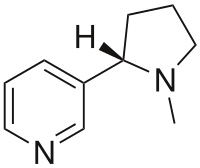
Photo from wikipedia
Alcohol is the most widely abused substance in Namibia and is associated with poor adherence and retention in care among people on antiretroviral therapy (ART). Electronic screening and brief interventions… Click to show full abstract
Alcohol is the most widely abused substance in Namibia and is associated with poor adherence and retention in care among people on antiretroviral therapy (ART). Electronic screening and brief interventions (eSBI) are effective in reducing alcohol consumption in various contexts. We used a mixed methods approach to develop, implement, and evaluate the introduction of an eSBI in two ART clinics in Namibia. Of the 787 participants, 45% reported some alcohol use in the past 12 months and 25% reported hazardous drinking levels. Hazardous drinkers were more likely to be male, separated/widowed/divorced, have a monthly household income > $1000 NAD, and report less than excellent ART adherence. Based on qualitative feedback from participants and providers, ART patients using the eSBI for the first time found it to be a positive and beneficial experience. However, we identified several programmatic considerations that could improve the experience and yield in future implementation studies.
Journal Title: AIDS and Behavior
Year Published: 2019
Link to full text (if available)
Share on Social Media: Sign Up to like & get
recommendations!